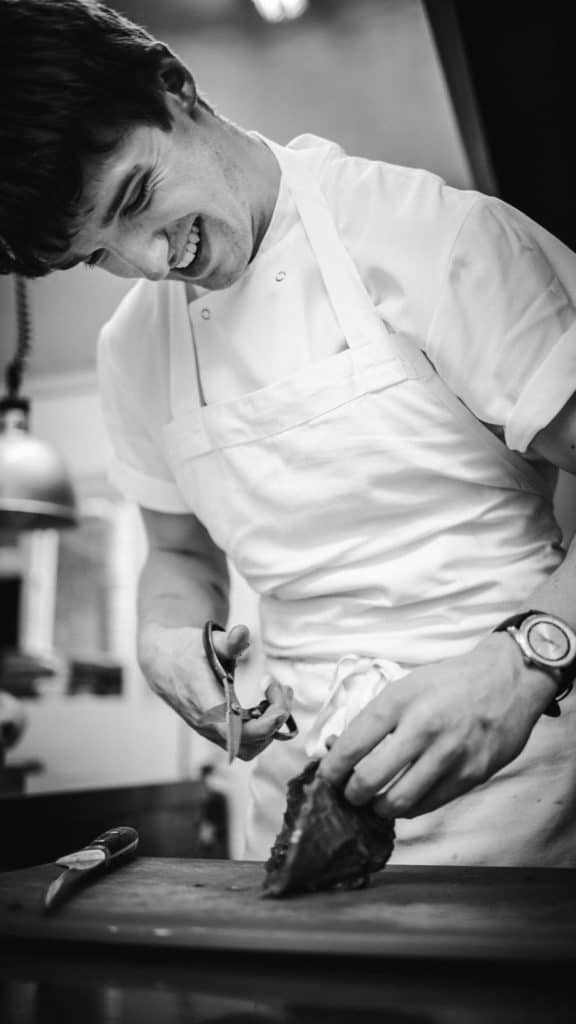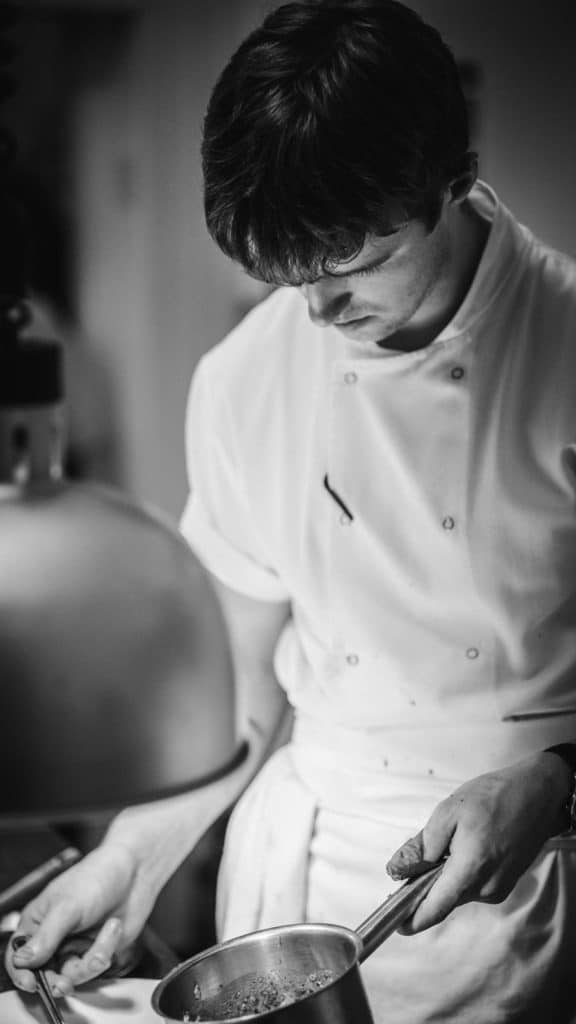What does it take to become a successful chef? (10 tips!)
Over the last 5 years, I have cooked what feels like everywhere: from small french restaurants to large banqueting kitchens, to 3 Michelin star establishments. I’ve worked under great chefs, awful chefs, and even opened a restaurant myself with my friend Alex. I can’t say I’ve seen it all, but I have learnt a whole lot about what it takes to succeed as a cook.

What does it take to be a successful chef? What attributes stand you in good stead? What is essential? What is unnecessary? This article is all about answering these questions- hopefully, to help anyone out there who wants to get there for themselves.
If you’re brand new to the trade, there is plenty here for you to chew on. If you’ve got some years behind you, you’ve probably found most of this out for yourself. Hopefully what I’ve learned can be of some value to someone else making their way up the ranks.
What does it take to become a successful chef?
- Your CV is almost nothing. Your knowledge, skills and attitude are everything.
- It’s very straightforward to learn how to cook well. It’s just not easy.
- College really doesn’t matter at all (borderline scam)
- If you don’t love eating and cooking food, it doesn’t make any sense to start.
- The hardest chef to work for is rarely the best chef.
- Never underestimate the power of working for free.
- Opportunities are everywhere you look for them.
- If you are right for the job, there is nothing else that compares to it.
- Confidence comes with experience and years under your belt.
- There is plenty of money at the top. Just focus on improving every day.
Your CV is almost nothing. Your knowledge, skills and attitude are everything
A lot of industries put significant importance on the quality of your CV. You’d be forgiven for thinking the same was true of cooking in great restaurants. I’ve got to say- The more I see of this business, the less I bother to update my CV at all.
The thing is, you can usually tell just by watching a chef cut an onion whether he knows what he’s doing. Does he work clean and fast? Is his knife sharp? Does he work with urgency? It sounds absurd, but the quality of a cook is much easier to tell by working with them for a day than it is by looking at their CV.
There are a lot of posers in this world. They were at a three-star for a year, but they did nothing but vacuum pack and pick herbs. They were sous chef at a place, but it turns out that everything was bought in and there wasn’t too much cooking going on.
Head chefs at some restaurants don’t even wash their hands. There are commis chefs at other restaurants that can butcher whole pigs and cook well above their pay grade.
Also maybe the most important component of a cook is their attitude. Are they team players? Do they love it? You are going to spend 80 hours of your week with this guy or girl. Does that make you cringe? CVs dont show if they still love to cook. They dont show if they’ve got a raging drug problem. If they can actually cook properly. If they’re gonna slag you off behind your back.
The thing is, It didn’t take me long to realise this. Everyone knows this. So there’s nothing wrong with having a spot on CV, but just know that it’s only what you do and how you do it that will determine your outcome in the end.
It’s very straightforward to learn how to cook well. It’s just not easy.
When I was just getting into cooking professionally, there was a period of a good 2 years where I was frustrated at my own progress. It seemed like most chefs were faster than me, more consistent than me, knew more than me, and just generally saw things that I didn’t see. They all plated more elegantly and faster. Their pasta work was more delicate. They seemed to come up with amazing menu ideas really easily. What I found difficult, they did without thinking.
In any kitchen worth working in, you will constantly be pushed and pushed and corrected and corrected. It’s so easy to feel disheartened, and like you’re missing something. Here is what you are missing:
The chefs you are comparing yourself to, have been doing this for years and years. If you are a chef for 2 years, you will be pretty good. But after 5-10-20 years? Pushing every day? Learning from mistakes? Seeing and tasting different combinations? Working in different restaurants and being influenced in different ways? You will be levels above. When you meet someone like this and feel like a weak chef, remember their experience. Remember what you are now compared to what you were 1 year ago. You will have learnt so much. It is the single best thing about our world.
Get in a kitchen with chefs who are better than you in 1 or more ways. Put your head down, work hard, learn where you can. Take responsibility and commit to the restaurant. When you feel too comfortable: either take more responsibility, change your role, or find another restaurant with a whole other group of chefs. Repeat this process for a good 10 years, and you will be a formidable cook. There is nothing else you need to do.

Read also: Too cheap for therapy? Read these books!
College doesn’t matter at all (Borderline scam)
The only way I know to explain what I mean by this is with a story.
When I was around 20, I was a commis pushing in a french kitchen focused on not getting fired. It was brutal, but I was learning loads and It was exactly what I signed up for. The chef, to put it one way, was quite a hard man to please.
We had a chef come for a trial shift. He was around 24, as he had finished university and then retrained to be a chef from his previous career. Before starting with us, he was used to the working world. Offices, passive aggression, HR.
He decided that he wanted to be a chef: so, as any normal person might think, he thought it best to study cuisine.
He went to the most prestigious cooking school in the world. He paid way over 30 grand (!!!) for a 9-month course. 9-5, 4 days a week. No doubt, he learnt some really cool things about cuisine.
He starts at this French restaurant in London. A real good serious kitchen.
He gets absolutely eaten alive. He cant take pressure. He’s late because he’s really not used to the hours. He has world-class knives with his college logo on them, but he can’t really use them because he hasn’t spent long enough using them.
When he’s slow and messy and unorganised, the chef obviously shouts. This seems to hit him like a tonne of bricks because he’d spent 35 grand learning about ingredients and history and recipes, and he’d never been shouted at. He’d never seen a chef shout. He’d never been put under any kind of pressure. He’d never written a food order. Hed never worked more than 50 hours in a week. He’d never been told that what he’s doing is nowhere near good enough. He was told, by the people he was paying, that he was doing really well.
He lasted 6 weeks.
Here’s how I ended up at that restaurant.
I knew I wanted to be a chef. I never went to college, I worked on a building site after dropping out of university. I had a year of experience so I could use my knife a little bit, but I knew I was way below the mark and had little to offer other than enthusiasm and energy.
I knocked on the kitchen door, asked to speak to the chef, and basically begged him for a job.
Words to the effect of “This is a level way above where I have worked before, and I really want to work here because I know I can learn loads. So I dont care what you pay me, and I dont care what the hours are. I just want to work here”.
That guy I was talking about, had been lied to. He was told, or lead to believe, that “Our course will put you in a really good position to succeed in the restaurant business. You will have a huge advantage over people who dont buy our course”
The truth? It’s a really hard and really rewarding game. If you are willing to really want to be a great chef, and you put your head down, and you actually love to cook and eat, and you learn to pick yourself up when you get knocked down, dont worry about it. You will succeed in the end. No one can stop you. Shy of this? Half committed? Reasonably want a balanced life? I dont really know what to tell you.
Every single thing, that’s ever been taught at a college, is in books and online. 80% of the content, really, is straight out of the 3 or 4 great cookbooks that every cook has on hand anyway. Plenty of great chefs went to college. But I can tell you that college didn’t make them succeed. They made them succeed.
If you dont love eating and cooking food, It doesn’t make any sense to start
Chefs work serious hours. Chefs dont get paid loads of money. That being said, you literally get to cook all day for a living. You can make a name for yourself as a chef. That is the reward.
If that sentence doesn’t excite you, if cooking isn’t your thing, if you dont have that curiosity, you really would be better off doing something else.
The career path of a cook is a bit different to that of other industries. It’s not like you start off doing a load of awful jobs, and then as you work your way up you end up just giving orders and overseeing. Maybe in some cases; but for the most part, the life of every cook follows the same pattern.
Start work in the morning, check the deliveries, organise and clean. Then mise en place- prepping, cleaning, prepping, cleaning. Set up for the lunch service, do the lunch service. Clean down, eat something, mise en place. Clean down, set up for dinner, then its dinner service. Clean again, organise the kitchen for the next day, write the orders and the prep list for the next day. Repeat, repeat, repeat.
This was my daily routine 5 years ago, and I’m sure it will be my routine 5 years from now. Any chef who really cooks has this same daily grind. If you dont enjoy this process, then I dont think it’s worth persisting in this business in hopes of a more relaxed and varied future. If you dont absolutely love the process of creating delicious food and serving it to people, you really would be far happier in some other industry. Make sure you really love it if you’re going to go for it!

The hardest chef to work for is rarely the best chef
I’m sure you’ve heard awful stories of angry chefs unleashing fury on young cooks and abusing staff who are massively overworked and underpaid. When I started as a cook, I knew I wanted to get as far as I could go. So I told myself that whatever abuse came my way, I would keep my head down and swallow it. Show no weakness. My technique worked quite well, and I never had it as bad as some of the chefs who end up needing counselling to deal with the absolute c*nts of humans they had to work under.
But I have realised something very interesting over the years: The awful, aggressive, whiny, snappy, bitchy chefs, are never the best chefs. Ever.
Think about it for a second. How can someone run a restaurant at the highest level, over a long period of time, if they can’t even control their own emotions? More often than not, a chef being really over the top angry is a chef who has lost control. It is a chef who doesn’t want to be accountable for the mistakes of his team. It is pure weakness.
I had this inkling for a while when I was working through my first kitchens. Why would the attributes of a great head chef, be any different from the attributes of a great leader more broadly? What sealed it for me was when I started getting the opportunity to work in kitchens with 1, 2 and 3 Michelin stars.
I might have worked in 5 different starred restaurants in my career. 3 of them, I would describe as an absolute pleasure to work at. Long hours and hard work, sure. But the chef leads from the front. Chefs and the front of house show each other genuine respect. Everyone knows just how lucky they are to be involved in those restaurants. They made me completely rethink the type of chef I want to be. (2 of these places were led by women by the way).
What about the other 2 restaurants on that list? I won’t lie, they were pretty brutal. 1 was a 3 star and the other a 2 star, both in London. They were hard work from before 8 till past midnight, and the chefs were very hard people to please. But there were no personal attacks. There was no physical abuse. There were no threats. I would readily work at either. It was nowhere near the worst Ive seen, and the food was totally next level. I learned an unexplainable amount in the time I was there. I won’t pretend to know exactly what it takes to run a restaurant of that standard.
Here’s what I do know for a fact. If you work for a chef who makes you depressed, makes you want to jump off a bridge, makes you want to drink way too much and accept your fate as a piece of shit, There is no way that they are anything special. I have worked under some of the great 2 and 3 star chefs in the country, and that is not how they carry themselves.
If your chef fits this description, you work for a bellend and you’re better off somewhere else. If you go to quit, and there’s talk that “you can’t take it” of you’ll never make it” or
“You’re not serious” or “you’re leaving them in the sh*t”, leave them in the sh*t. It’s where they belong.
Read also: Is it ok not to have goals? (THE TRUTH)
Never underestimate the power of working for free
A couple of years ago, My friend Alex was planning to open his restaurant and I was planning to join him. I had 3 months of free time, that I wanted to fill with some good work. So I made my CV look as sharp as I could, and I went around my 5 favourite restaurants at the time. There were 2 3 stars and 3 1 stars on the list. My plan was to shake the chef’s hand, give them my cv, and explain myself.
Everyone but one of the 1 stars never responded. The 3 stars, by the way, I couldn’t even get anywhere near the actual kitchen. There was one restaurant on that list that called me in to talk. When I explained my commitments to the new opening, they explained that they weren’t interested in employing a chef just for a month or two. I thought about how much I could learn in a place like that and told the chef that I would work for a month for free and that I was keen to get started.
To cut a long story short- I had an amazing experience working in that kitchen. I learnt things that I still draw on today. The chef, because she was generous, and because she appreciated the work I’d done, picked up the phone and used her influence to get me work experience at 2 incredible 3 stars in London the next month. One of those, by the way, was a restaurant that completely ignored my CV the first time around. Although I had commitments and was not looking for a job, I went on to receive offers from some of the most incredible restaurants in the country. All because I was willing to work hard, for a month, and I didn’t care about the money.
I have heard countless stories about all different situations. They all have the same lesson. Never underestimate the power of working for free!
Opportunities are everywhere you look for them
When you are a young chef, you have all these options. Let’s say you have a couple of years of experience and are deciding on that next big move that will take your career and knowledge to the next level.
You could go to France. You could go to another city. You could stay in this city but work at a better restaurant. You could stay at this restaurant, but take more responsibility and push for promotion. You could work in the countryside and learn all about game and butchery and wild mushrooms. You could do pastry. You could take 6 months and do 2 weeks at 10 different incredible restaurants to find out the kind of kitchen you want to work in.
I have been faced with these decisions many times. There are infinite paths. What decision should you make? I can’t tell you what to do because it’s none of my business. My point here is that you shouldn’t worry too much.
Take a look at that list again. They are all incredible options. You will learn absolutely loads in each case. Each move would be a great, logical step forward for you. I dont know what the absolute best option for you would be, and neither does anyone else. But they are all amazing options. So pick one using the information you’ve got, get excited about it, and dont waste time worrying about what could’ve been.
If you are right for the job, there is nothing else that compares to it
This is kind of the other side of my previous point: “If you dont love cooking and eating food, it doesn’t make any sense to start”. What if you do love cooking and eating food? In my experience, nothing else with fill the gap in your being that restaurants will.
I’m aware that I’m speaking to a very small percentage of people who have stumbled across this article. It’s hard to describe to people not in our industry. But think about this. The thing that I’m most curious about, most passionate about, most excited about, most want to be remembered for, is also the thing that I do for a living. How many people can really say something like that?
What draws people like me to the craft, I think, is that there is always better out there. The food can be more perfect. More creative. More consistent. More delicate. Bolder. More beautiful. If you have been a chef for a few years then you have learnt an incredible amount about cooking great food. You have also learnt that you know almost nothing.
When every day is about being better, life is very exciting. If you feel passionate about cuisine, it is a privilege to pass on to other chefs knowledge that was passed on to you. All your knowledge has been amassed and refined and passed on from generations of passionate cooks. There is something absolutely magical about our world.
I haven’t even mentioned food itself. Forget all the rest. Not many people can really make great food, but almost everyone knows it when they taste it. Delicious food is self-evident. There is no fraud in cooking. If your food is really good, people absolutely love it. If your food is bad, people want their money back. It’s honest in that respect.
Confidence comes with experience and years under your belt
This is something that seems so obvious in hindsight but is much less obvious when you are a young chef working your way up. When you start, everything is very difficult and requires attention. The chances are, most of your focus and mental energy will go into just doing your job reasonably well. Fair enough.
You just might want to know that as time goes on, the things that you used to think about you no longer have to think about. Staying organised, keeping your knife sharp, cooking multiple things at once, following the service, accommodating last-minute changes here and there; are all things that can seem intimidating to anyone in their first couple of years. But you look at a chef with 10 good years under their belt. 0% of their focus really goes into stuff like this. It’s in them. That’s really the only way I can describe it.
Processes become more and more fluid and automatic. You pick up 100 tiny details from different chefs that make you that bit more efficient and slick. After hundreds of awful services and years of taking pressure, these things seem like just another day. They stop becoming emotional. You can honestly start to thrive and enjoy your job more and more. This life gets better and better over time.
There is plenty of money at the top. Just focus on improving every day
This is a topic that I think isn’t discussed enough in our industry. Some chefs seem to think that they are artists and that you cannot be a true cook and also be motivated by money. Honestly, I dont buy it.
Dont get me wrong, you cannot only be motivated by money. You cannot be mainly motivated by money. But can you like the money? Want to make a lot of money? Plan your life in a way where you can be a great chef, and have financial success? Of course, you can. I think you’d be bloody stupid not to.
Any cook, like any adult human, would do well to mind their business. How much do you make? How much are you on track to make on your current path? What is your current lifestyle? What is your ideal lifestyle? How can you have the career you want, and the money you want, and the life you want? If your instinct is to say you can’t have it all, I think you can come up with a better answer. You must think for yourself, rather than just blindly follow some self-explanatory career path, if you are to really maximise the quality of your life and success.
To be frank, this blog is my attempt at a better answer. I absolutely love my job, I dont make enough money to build the life that I know I could have. If you are in a similar position, think of something and put your head down.
My advice is not to do what I have done. My advice is not to be unsatisfied with what you are being paid. My advice is to really think about your career path, finances and lifestyle and take full responsibility for your full life experience.
Enjoyed this post? Check out some of our best!
Winning by Tim Grover- Book review and summary!





